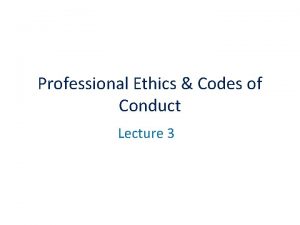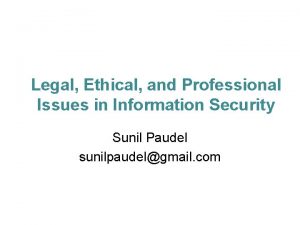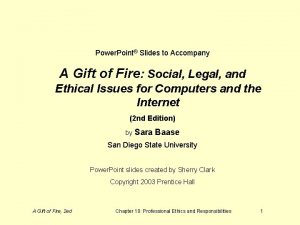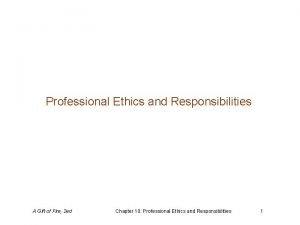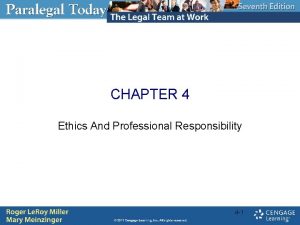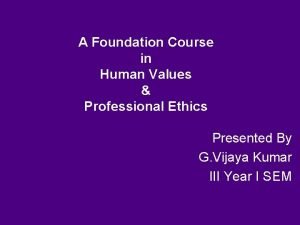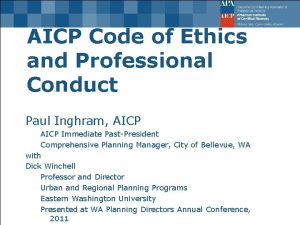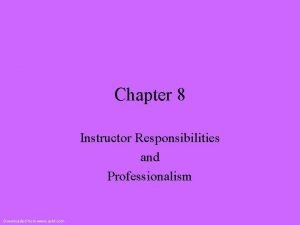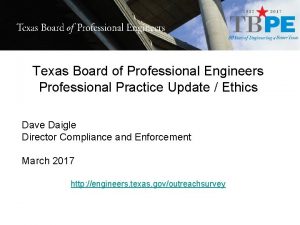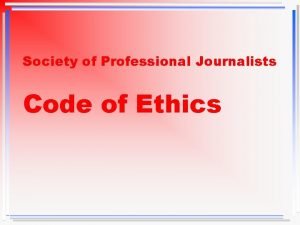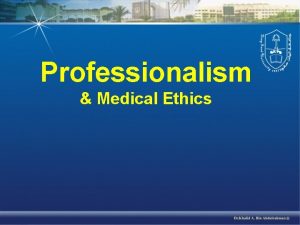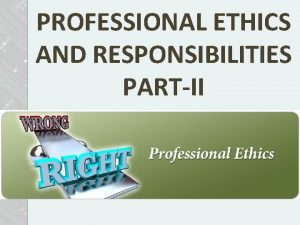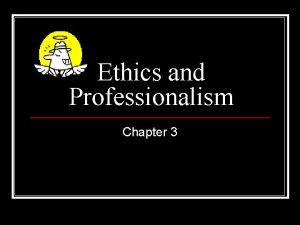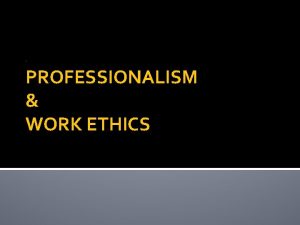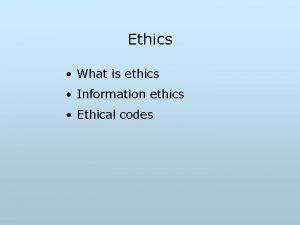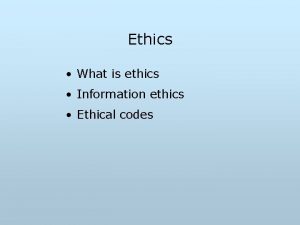Professional Codes of Ethics Professionalism and Codes of













- Slides: 13

Professional Codes of Ethics Professionalism and Codes of Ethics

Starter Questions n What is a "profession"? ¨ the body of people in a learned occupation; ¨ an occupation requiring special education wordnet. princeton. edu/perl/webwn ¨ The term profession is applied to those persons who have specialized and technical skill or knowledge which they apply, for a fee, to certain tasks that ordinary and unqualified people cannot ordinarily undertake. The term derives from the Latin: "to swear (an oath)". . en. wikipedia. org/wiki/Profession

Starter Questions n Is software development a profession like CPA, doctor, lawyer, …? n Should software engineers be licensed like CPAs, doctors, lawyers, and barbers?

State Licensing n Licensing is a state activity required of those who provide certain types of services directly to the public, such as contractors, physicians, electricians, barbers, and child care providers. n A professional engineer is an individual who has been granted by a governmental authority the right to use that title and to offer professional engineering services to the public. ¨ Every state has an engineering licensing law, but the details vary from state to state.

"PE" = Professional Engineer 1. 2. A four-year degree from a university program accredited by the Accreditation Board for Engineering and Technology (ABET) An eight-hour examination on the fundamentals of engineering (FE) n 3. 4. 5. usually taken in the senior year of college Four years of acceptable experience A second examination on principles and practice Written recommendations from other PEs Some states also mandate continuing education.

Who are PEs? 2014 U. S. A. - 822, 575 South Carolina - 10, 097

The ACM on Licensing Not Practical Ø The Fundamentals of Engineering (FE) examination, required for licensing as a PE, is inappropriate for those receiving computer science degrees. Ø Not all practicing software engineers graduate from departments that are eligible for ABET accreditation. Ø Large software development efforts often span multiple states, and resulting software might be sold in every state. Ø The time required to update the examinations does not match the rapid rate of technology change in computer science. Ø It is unlikely that any reasonable test for software engineering skill in safety critical systems could be put into a multiple-choice format. Ø The breadth of people involved in the production of software would make licensing of them impractical and not particularly helpful.

Codes of Ethics n Most professions have a Code of Ethics ¨ n Code of Ethics ¨ ¨ n Doctors, Lawyers, Certified Public Accountants, Librarians, … assists in deciding right and wrong aspirational Code of Conduct ¨ ¨ employee rules enforcement

ACM Code of Ethics 1. GENERAL MORAL IMPERATIVES. 1. 1 Contribute to society and human well-being. 1. 2 Avoid harm to others. boyscout-ish 1. 3 Be honest and trustworthy. property rights 1. 4 Be fair and take action not to discriminate. 1. 5 Honor property rights including copyrights and patent. 1. 6 Give proper credit for intellectual property. 1. 7 Respect the privacy of others. privacy 1. 8 Honor confidentiality.

2. MORE SPECIFIC PROFESSIONAL RESPONSIBILITIES. 2. 1 Strive to achieve the highest quality, effectiveness and dignity in both the process and products of professional work. 2. 2 Acquire and maintain professional competence. 2. 3 Know and respect existing laws pertaining to professional work. 2. 4 Accept and provide appropriate professional review. 2. 5 Give comprehensive and thorough evaluations of computer systems and their impacts, including analysis of possible risks. 2. 6 Honor contracts, agreements, and assigned responsibilities. 2. 7 Improve public understanding of computing and its consequences. 2. 8 Access computing and communication resources only when authorized to do so.

3. ORGANIZATIONAL LEADERSHIP IMPERATIVES. 3. 1 Articulate social responsibilities of members of an organizational unit and encourage full acceptance of those responsibilities. 3. 2 Manage personnel and resources to design and build information systems that enhance the quality of working life. 3. 3 Acknowledge and support proper and authorized uses of an organization's computing and communication resources. 3. 4 Ensure that users and those who will be affected by a system have their needs clearly articulated during the assessment and design of requirements; later the system must be validated to meet requirements. 3. 5 Articulate and support policies that protect the dignity of users and others affected by a computing system. 3. 6 Create opportunities for members of the organization to learn the principles and limitations of computer systems. 4. COMPLIANCE WITH THE CODE. 4. 1 Uphold and promote the principles of this Code. 4. 2 Treat violations of this code as inconsistent with membership in the ACM.

IEEE-CS/ACM Software Engineering Code of Ethics 1. 2. 3. 4. 5. 6. 7. 8. Public Client and Employer Product Judgement Management Profession Colleagues Self

Next Classes… n Proposal Presentations
 Acm ethics behavior
Acm ethics behavior Ethics and professional responsibility cpd
Ethics and professional responsibility cpd Law and ethics in information security
Law and ethics in information security Cips code of ethics and professional conduct
Cips code of ethics and professional conduct Gift of fire
Gift of fire Nala paralegal canons of ethics
Nala paralegal canons of ethics A foundation course in value education
A foundation course in value education Aicp code of ethics and professional conduct
Aicp code of ethics and professional conduct Ac61-98 plan of action
Ac61-98 plan of action Professionalism and integrity
Professionalism and integrity Integrity and professionalism
Integrity and professionalism Macro ethics definition
Macro ethics definition Tbpe online ethics exam answers
Tbpe online ethics exam answers Code of ethics of the society of professional journalists
Code of ethics of the society of professional journalists
